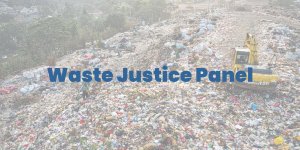Presented By: Environmental Consulting Organization at the University of Michigan
Zero Waste Week: Waste Justice Panel

Join us for a panel discussion of waste colonialism and justice in the linear economy.
This panel discussion will engage with the broad idea that our linear economies, in which items are produced, sold, used, and thrown away, are not only harmful to our ecosystems but to the communities (humans and non-humans) who live, work, play, and pray in these very same ecosystems. A key example of such dynamics is that every part of the process of making, consuming and disposing of single-use plastics is harmful to our people and to our planet. From the pipeline fracking needed to produce the raw oil to make plastics, to its transport to oil refineries, in cities like Detroit, and to petrochemical facilities, in cities like Houston, TX and St. James, LA, to its disposal in landfills, incinerators, and in low-income and BIPOC communities’ backyards in the Global North and South, the toxic impacts of our single-use plastic economies cannot be denied.
It is those very same communities, who are at the forefront of our unjust waste producing systems, who are also at the forefront of building equitable and just alternatives to these systems. The alternatives and solutions include anti-incineration struggles; community-based recycling and composting programs, food and secondhand goods redistribution services, sharing economies, and mutual aid networks; human rights campaigns to advocate for the rights of waste pickers and of families to safe working conditions and environments; the passing of progressive policies, like single-use plastic bans, to hold corporate actors accountable; and the list goes on.
The panelists, who will be speaking about their work at this event, emerge from numerous fields, such as community composting and recycling, social services, global policy organizing, and are integral to our waste justice movements. We hope that by the end of the event, attendees will walk away feeling more confident about answering the following questions for themselves:
What does waste justice look like on the ground in Detroit and other parts of the world?
How should zero waste strategies be integral to our climate action strategies?
How can I support these efforts and stay connected to them?
This panel discussion will engage with the broad idea that our linear economies, in which items are produced, sold, used, and thrown away, are not only harmful to our ecosystems but to the communities (humans and non-humans) who live, work, play, and pray in these very same ecosystems. A key example of such dynamics is that every part of the process of making, consuming and disposing of single-use plastics is harmful to our people and to our planet. From the pipeline fracking needed to produce the raw oil to make plastics, to its transport to oil refineries, in cities like Detroit, and to petrochemical facilities, in cities like Houston, TX and St. James, LA, to its disposal in landfills, incinerators, and in low-income and BIPOC communities’ backyards in the Global North and South, the toxic impacts of our single-use plastic economies cannot be denied.
It is those very same communities, who are at the forefront of our unjust waste producing systems, who are also at the forefront of building equitable and just alternatives to these systems. The alternatives and solutions include anti-incineration struggles; community-based recycling and composting programs, food and secondhand goods redistribution services, sharing economies, and mutual aid networks; human rights campaigns to advocate for the rights of waste pickers and of families to safe working conditions and environments; the passing of progressive policies, like single-use plastic bans, to hold corporate actors accountable; and the list goes on.
The panelists, who will be speaking about their work at this event, emerge from numerous fields, such as community composting and recycling, social services, global policy organizing, and are integral to our waste justice movements. We hope that by the end of the event, attendees will walk away feeling more confident about answering the following questions for themselves:
What does waste justice look like on the ground in Detroit and other parts of the world?
How should zero waste strategies be integral to our climate action strategies?
How can I support these efforts and stay connected to them?
Explore Similar Events
-
Loading Similar Events...
